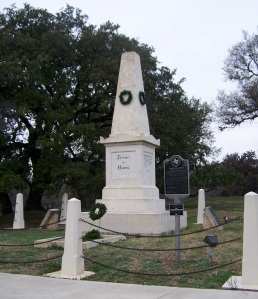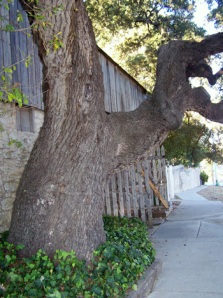As I am going up to Comfort on the 11th, to take part in the 150th anniversary observences of the Nueces Fight, and since it has been a while since I wrote about this — herewith some background.)

Who would have thought that deep in the heart of a staunchly Confederate state, there would have been a large population of Unionists? But there was; and not only did they vote against Secession, but the governor of Texas himself was a Unionist. He was none other than Sam Houston himself, the hero of San Jacinto, who more than any other Texas man of note had politicked and maneuvered for ten long years so that Texas could join the United States. In the end, Texas seceded; instead of going it alone again, the secession party joined the Confederacy with what some observers considered to be reckless enthusiasm – especially considering the perilous position of those settlements on the far frontier. Those settlements had been protected from marauding Comanche, Apache and Kiowa by the efforts of US troops – and who would guard them now? When the Texas legislature passed a law requiring all public officials to swear an oath of loyalty to the Confederacy, Sam Houston resigned rather than take it. Being then of a good age, of long and devoted service to the people of Texas and held in deep respect even by citizens who didn’t agree with his stand, Sam Houston retired without incident to his home near Huntsville.
Other staunch Unionists in Texas were not able to refuse the demands of the Confederacy as easily as wily old General Sam. Among those who felt the wrath of the Confederacy most keenly were the German settlers of the Hill Country. Most of those settlers had come from Europe in the late 1840s; others had settled in San Antonio, Galveston and Indianola. In many cases they were the mercantile elite, as well as providing a solid leavening of skilled doctors, engineers, scientists, artists, teachers and writers in those communities. They were also Abolitionists; and in an increasingly perilous position as the split between free-soil states and those which permitted chattel slavery widened during the 1850s. Once Texas went Confederate, they were in even more danger, although they did not at first appear to realize this. Those citizens and counties which favored the Union and abolition could not easily separate, as West Virginia had from Virginia: they were stuck. The war began and ground on … and the breaking point came early in 1862 with passage of a conscription law. Every white male between the age of eighteen and thirty-five was liable for military service. This outraged those who had been opposed to slavery and secession, to the point of riots, evasion and covert resistance. Texas abolitionists and Unionists would be forced to fight in defense of an institution they despised, and for a political body they had opposed. Only a bare handful of men from Gillespie, Kendall and Kerr counties volunteered for service in the Confederate Army throughout 1861 and 1862, although good few more were perfectly willing to serve as state troops protecting the frontier, or in local volunteer companies of Rangers. Anyone who wanted a fight could take on the Indians, without the trouble of going east for military glory.
Before very long, the distinct un-enthusiasm in the Hill Country for the Confederacy and all its works and ways became a matter of deep concern to military and governing authorities. In a way, it was a clash of mind-sets: the German immigrants were innocently certain that the freedom of speech and political thought which they had always enjoyed since coming to Texas were still viable. The pro-Confederate authorities saw such thought and speech as disloyalty, clear evidence of potentially dangerous spies and saboteurs … and acted accordingly. In the spring of 1862, Gillespie and Kerr County was put under harsh martial law. All men over the age of 16 were ordered to register with the local provost marshal and take an oath of allegiance to the Confederacy. Few did so – and many never heard of the order, until the state troopers arrived to enforce it, under the command of a peppery, short-tempered former teamster; Captain James Duff.
By summer, Captain Duff ordered the arrest of any man who had not taken the loyalty oath. His troopers waged a savage campaign; flogging men they had arrested until they told his troopers what they wanted to hear, wrecking settler’s homes, arresting whole families, and confiscating foodstuffs and livestock. Men of draft age took to hiding out in the brush near their homes, while their families smuggled food to them. Frequently parties of Duff’s men assigned to arrest certain men returned empty-handed, with the subject of the arrest warrant left dangling on a rope from a handy tree on the return journey. Four out of six men arrested near Spring Branch in the Pedernales Valley and taken to be interned with other Unionists were summarily lynched when two of them escaped while their guards were asleep. A state trooper serving in the Fredericksburg area at that time remarked, “Hanging is getting to be as common as hunting.” Suspicion followed by repression bred resentment and defiance, which bred violence… and resistance.
(To be continued …)



Recent Comments